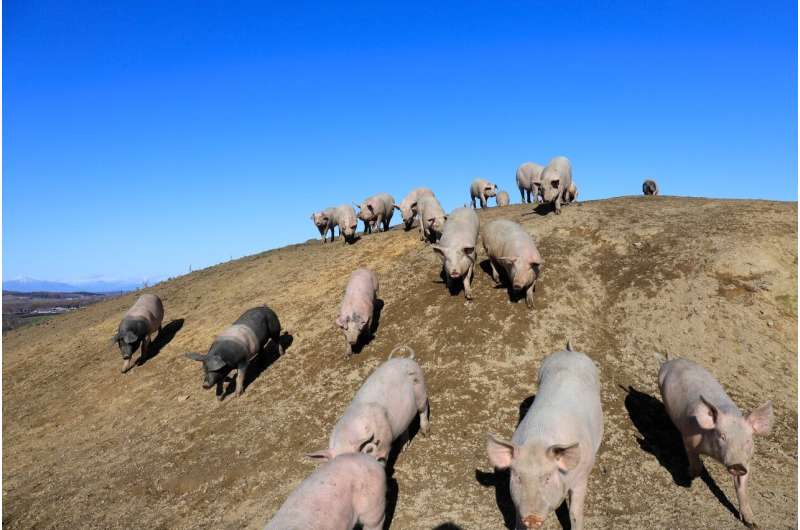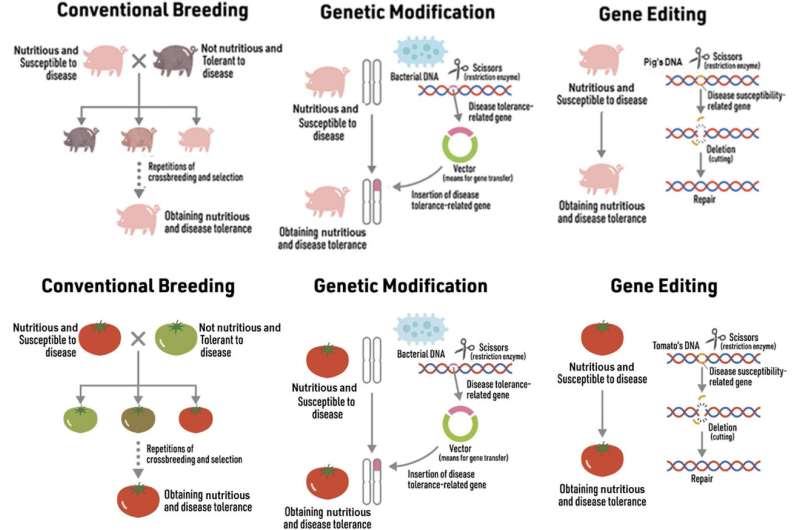Japanese consumers more concerned about gene-editing of livestock than of vegetables, survey shows

A statistically rigorous survey of Japanese consumers has found that they have more negative opinions about the use of new gene-editing techniques on livestock than they do about use of the same technologies on vegetables.
The survey findings were reported in the journal BMC CABI Agriculture and Bioscience on March 31st, 2021.
Because humans tend to feel closer to animals than plants, and commonly express feelings regarding animal welfare but not plant welfare, the researchers, led by Naoko Kato-Nitta, a research scientist at Tokyo's Joint Support Center for Data Science Research and Institute of Statistical Mathematics, wanted to see if such moral or taxonomic distinctions would produce any difference in their attitudes towards use of emerging gene-editing techniques such as CRISPR-Cas9.
Earlier surveys had shown subtle differences in consumer attitudes towards genetic modification, where foreign DNA is inserted into an organism's genome, compared to gene-editing, where an organism's genes are tweaked but no foreign DNA is introduced.
Via an online survey of just over 4,000 participants aged 20 to 69, the researchers found that there was indeed a significant difference. The participants were shown a visual diagram explaining how gene-editing works and then asked how they felt about it. The survey results showed that they were more likely to be worried about the use of gene-editing techniques on livestock than on plants.

But in a twist to the study design, the researchers split the participants into two groups. In the first, the explainer diagram included cartoon pictures of pigs, and in the second, the diagram included cartoon pictures of tomatoes.
The group that had been shown pictures of cartoon pigs were subsequently less likely to raise concerns about gene-editing of livestock than the group that had been shown pictures of cartoon tomatoes. The researchers believe that this may be because the pictures of the pigs "primed" the survey participants to be open to livestock gene-editing.
"In contrast, the group shown the gene-editing of cartoon tomatoes had in effect been asked to infer how they would feel if the same thing was done on pigs," says Naoko Kato-Nitta, the lead author of the paper and a specialist in risk communication at ROIS and the Institute of Statistical Mathematics in Tokyo. "There was a higher emotional hurdle to be overcome in the second group.This means that public attitudes towards food can change as a result of just one small change to how information is provided," she adds. "And so experts really need to pay careful attention to the impact of how they contextualize their discussions of gene-editing."
The survey participants were also asked a series of questions assessing their level of scientific literacy. The researchers found that those with higher levels of scientific literacy were more supportive of using gene-editing to deliver improvements in vegetables, and more supportive of using gene-editing to make livestock more resistant to disease. Those with higher levels of scientific literacy thus may be more open to medical applications of biotechnology than agri-food applications.
In the 1990s, strong public opposition to genetically modified crops led to the Japanese government's introduction of strict regulations on such techniques, as well as the labeling of GM food items. Currently there is no commercial cultivation of GM crops in the country. And so the researchers now want to perform the study again in other countries in order to see if the plant-animal consumer distinction is culturally specific to Japan.
More information: Naoko Kato-Nitta et al, Effects of information on consumer attitudes towards gene-edited foods: a comparison between livestock and vegetables, CABI Agriculture and Bioscience (2021). DOI: 10.1186/s43170-021-00029-8
Provided by Research Organization of Information and Systems





















